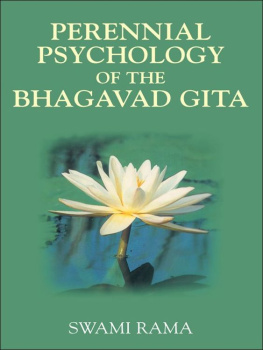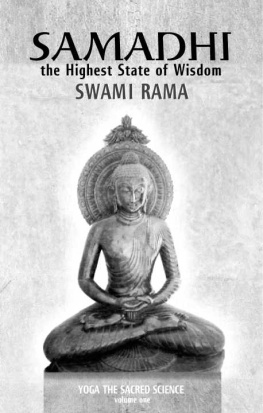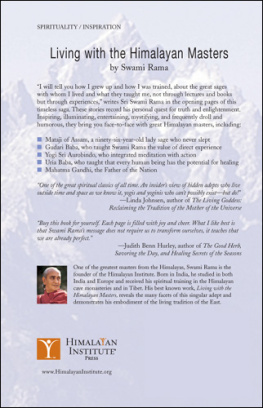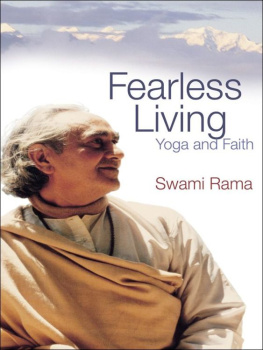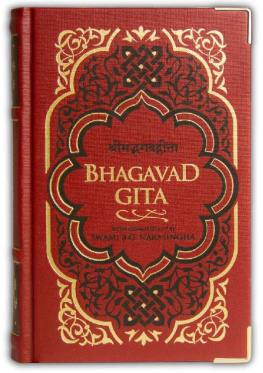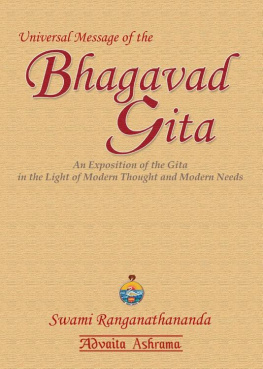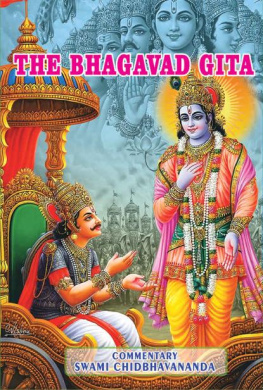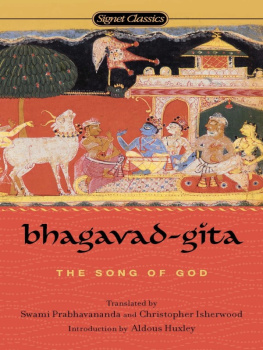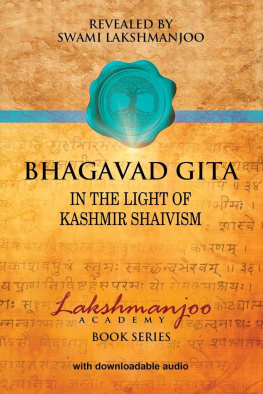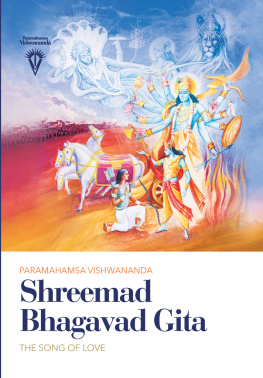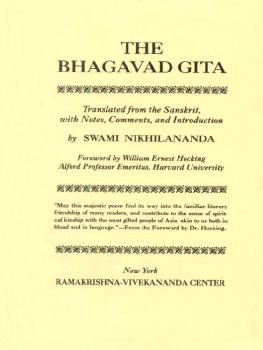Swami Rama - Perennial Psychology of the Bhagavad-Gita
Here you can read online Swami Rama - Perennial Psychology of the Bhagavad-Gita full text of the book (entire story) in english for free. Download pdf and epub, get meaning, cover and reviews about this ebook. year: 2007, publisher: Himalayan Institute Press, genre: Religion. Description of the work, (preface) as well as reviews are available. Best literature library LitArk.com created for fans of good reading and offers a wide selection of genres:
Romance novel
Science fiction
Adventure
Detective
Science
History
Home and family
Prose
Art
Politics
Computer
Non-fiction
Religion
Business
Children
Humor
Choose a favorite category and find really read worthwhile books. Enjoy immersion in the world of imagination, feel the emotions of the characters or learn something new for yourself, make an fascinating discovery.
- Book:Perennial Psychology of the Bhagavad-Gita
- Author:
- Publisher:Himalayan Institute Press
- Genre:
- Year:2007
- Rating:3 / 5
- Favourites:Add to favourites
- Your mark:
- 60
- 1
- 2
- 3
- 4
- 5
Perennial Psychology of the Bhagavad-Gita: summary, description and annotation
We offer to read an annotation, description, summary or preface (depends on what the author of the book "Perennial Psychology of the Bhagavad-Gita" wrote himself). If you haven't found the necessary information about the book — write in the comments, we will try to find it.
Perennial Psychology of the Bhagavad-Gita — read online for free the complete book (whole text) full work
Below is the text of the book, divided by pages. System saving the place of the last page read, allows you to conveniently read the book "Perennial Psychology of the Bhagavad-Gita" online for free, without having to search again every time where you left off. Put a bookmark, and you can go to the page where you finished reading at any time.
Font size:
Interval:
Bookmark:
PERENNIAL PSYCHOLOGY OF THE BHAGAVAD GITA
ALSO BY SWAMI RAMA
BOOKS
Living with the Himalayan Masters
The Art of Joyful Living
Meditation and Its Practice
The Royal Path: Practical Lessons on Yoga
Path of Fire and Light
Exercises for Joints and Glands
Fearless Living: Yoga and Faith
Happiness Is Your Creation
Perennial Psychology of the Bhagavad Gita
A Practical Guide to Holistic Health
Spirituality: Transformation Within and Without
Choosing a Path
Love and Family Life
Love Whispers
The Valmiki Ramayana Retold in Verse, Vols. I and II
Book of Wisdom: Ishopanishad
Wisdom of the Ancient Sages: Mundaka Upanishad
Freedom from the Bondage of Karma
Creative Use of Emotion
Celestial Song/Gobind Geet
Japji: Meditation in Sikhism
Nitnem: Spiritual Practices of Sikhism
CO-AUTHORED BY SWAMI RAMA
Meditation in Christianity
Science of Breath
Yoga and Psychotherapy
AUDIO & VIDEO
Guided Meditation for Beginners
A Guide to Intermediate Meditation
First Step Toward Advanced Meditation
Guided Meditation for Initiates
Inner Peace in a Troubled World
Stressless Living
Spiritual Origins of Health
Finding Meaning in Life
How to Tread the Path of Superconscious Meditation
SWAMI RAMA

Himalayan Institute Press
952 Bethany Turnpike
Honesdale, PA 18431
www.HimalayanInstitute.org
1985 by Himalayan International Institute of Yoga Science and Philosophy of the USA
All rights reserved. No part of this book in any manner, in whole or in part, in English or in any other language, may be reproduced or transmitted in any form or by any means, electronic or mechanical, including photocopying and recording, or by any information storage or retrieval system without prior written permission of the copyright owner.
Seventh printing 2008
ISBN-13: 978-0-89389-090-2
ISBN-10: 0-89389-090-1
Printed in the USA
Library of Congress Cataloging-in-Publication Data:
Rama, Swami, 1925-1996
Perennial Psychology of the Bhagavad Gita.
1. BhagavadgitaCommentaries. 2. Bhagavadgita
Psychology.
1. Bhagavadgita. English. 1984.
II. Titles
BL1138.66.R36 1984 294.5924 8425137
The completion of this work would not have been possible without the generous and untiring assistance of Carol Kingsbury, who spent long hours typing; Aparna Bharati and Dr. Arpita, who assisted with the editing; and Anne Morrow, who managed our household in India while we worked on the commentary. Pandit Usharbudh Arya provided the translation of the Sanskrit text. The cover photograph was taken by Carol Kingsbury.
Swami Ajaya, a practicing clinical psychologist, acted as consultant throughout the writing of the book, and his input served to enhance the final product.
The Bhagavad Gita is the fountainhead of Eastern psychology, and this commentary is designed to draw out its psychological concepts and make them accessible to all students. These profound psychological insights are intertwined in the Bhagavad Gita with philosophical concepts, so the task undertaken here is to separate the psychological principles and to explain their practical application.
Self-realization is the goal of human life. The purpose of Eastern religion, philosophy, and psychology is to fulfill that goal. Philosophy as it is understood in the East is neither a mere speculative exercise nor an intellectual adventure. The word philosophy is a compound of two words: philo and sophia, which mean love for knowledge. But this term is not applicable in the East, for those who consider the prime questions of life such as: Who am I? From where have I come? Why have I come? and Where will I go? are not interested in only the intellectual answers to these questions. The subject matter of Eastern philosophy leads the student through a systematic way of directly experiencing the truths of existence and the height of Self-realization. After realizing ones real Self, one knows that this Self is the Self of all.
In the Vedantic tradition the term Brahma Vidya is used instead of the term philosophy. It has a different connotation and a deeper meaning than the word philosophy conveys, and it is unique in its approach to knowledge. Brahma Vidya means the knowledge that leads one to realize Brahman, the Self of all. The Bhagavad Gita conveys that wisdom in its entirety and teaches the practical methods for the study and transformation of ones inner being. Philosophy and psychology are thus intermingled. Without the help of psychologyknowing, analyzing, and learning to use our inner potentialswe cannot fulfill the goal of human life: Self-realization.
In contrast, Western philosophy is intellectual and deals with mans relationship with the universe. With the knowledge he gains, he tries to understand his status in the universe. In Brahma Vidya, however, one comes to know all the levels of his being and finally to realize his true Self. According to the Eastern system, knowing the real Self is the first and foremost purpose of life. After Self-realization all the mysteries of the universe and ones relationship with the universe are revealed. Because of their contrasting approaches, there is a wide gulf between philosophy and Brahma Vidya. One is only theoretical, but the other is practical as well.
Though the Bhagavad Gita is composed of only seven hundred verses, it contains all the principles of the philosophy and psychology of the East. There are eighteen lessons in the Bhagavad Gita, each describing a different aspect of the process of self-transformation. This commentary emphasizes the psychological principles found in each chapter of the Bhagavad Gita. The sadhana (spiritual practice) described in each section is explained so that aspirants can help themselves progress in the inward journey and attain the highest state of bliss. The aim of the Bhagavad Gita is to teach the aspirant how to establish equanimity both in his internal life and in his activities in the external world; to help him develop tranquility within, and to explain the art and science of doing actions skillfully and selflessly.
The teachings of the Bhagavad Gita help one to understand the distinction between the real Self and the mere self. The mere self is subject to change and destruction; the real Self is not. The aspirant should understand both and should finally establish himself in his essential nature: Atman. Then he can live in the world without being affected by it. In the domain between the real Self and the mere self lies our antahkarana (internal instrument), which plays a most important part in both our internal and external life. If not understood, both goals of lifeliving in the world and Self-realizationare defeated. Our psychological life needs profound and deep study if we are to free ourselves from the quagmire of emotionality, egotistical preoccupations, and self-delusion and if we are to realize our fullest potentials for the unfoldment of consciousness.
The perennial psychology of the Bhagavad Gita deals with analyzing and training the internal processes of the human being so that one becomes creative in the external world and attains a state of tranquility at the same time. That which needs detailed analysis, understanding, and unfoldment is the mental life, which is vast in its characteristics. The outside world can be mastered only when the inner potentials are systematically explored and organized. Without understanding ones inner potentials, it is not possible to function effectively and harmoniously in the external world, for all things happen within before they are expressed externally.
Next pageFont size:
Interval:
Bookmark:
Similar books «Perennial Psychology of the Bhagavad-Gita»
Look at similar books to Perennial Psychology of the Bhagavad-Gita. We have selected literature similar in name and meaning in the hope of providing readers with more options to find new, interesting, not yet read works.
Discussion, reviews of the book Perennial Psychology of the Bhagavad-Gita and just readers' own opinions. Leave your comments, write what you think about the work, its meaning or the main characters. Specify what exactly you liked and what you didn't like, and why you think so.

